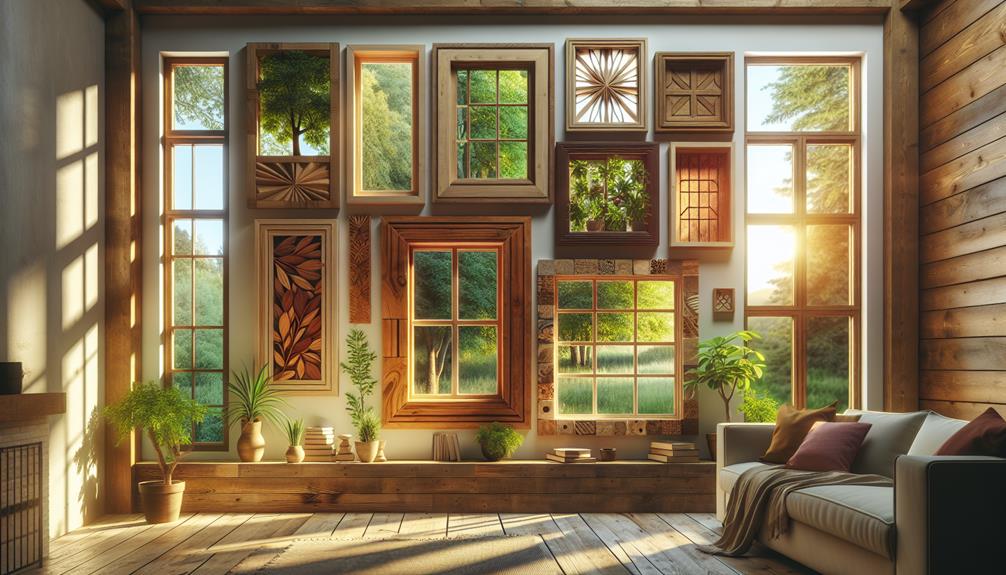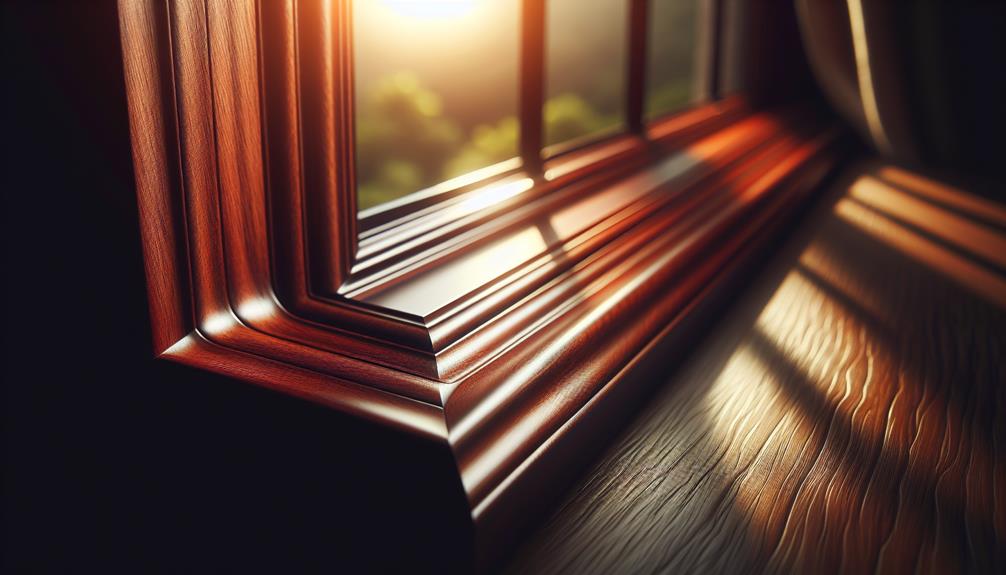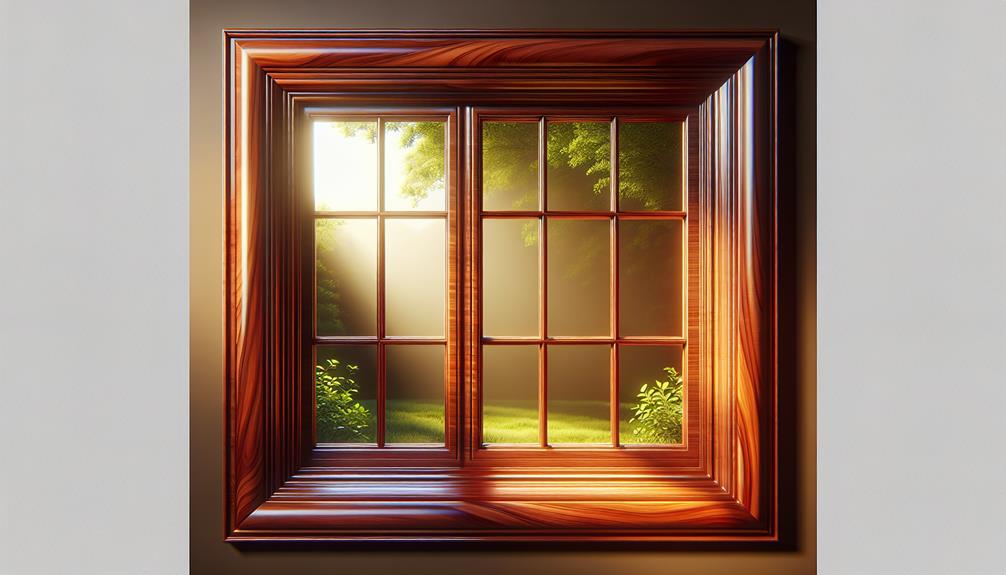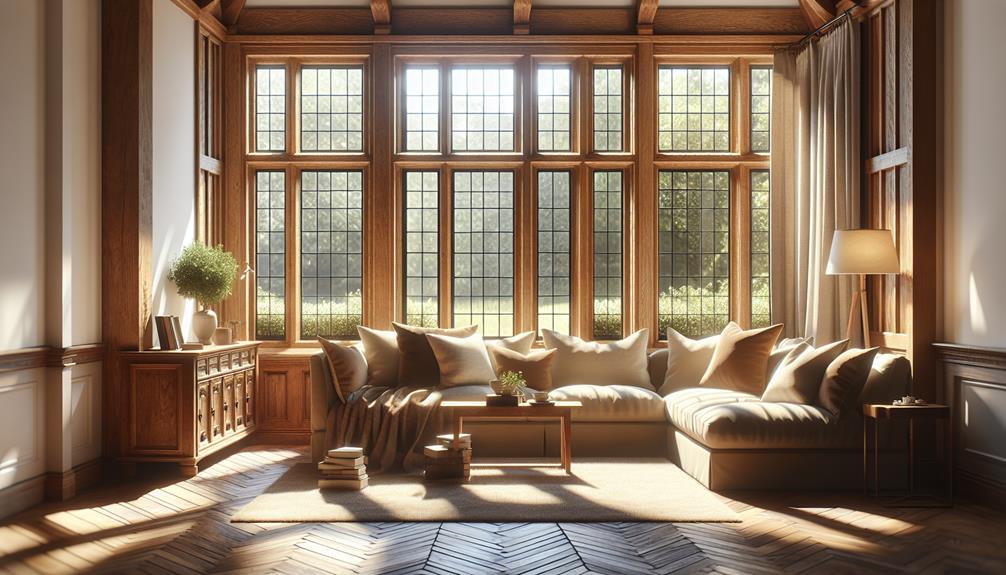Selecting the right wood for window frames impacts durability, insulation, and aesthetics. Accoya offers exceptional durability and decay resistance, making it ideal for weatherproof windows. Mahogany provides remarkable insect resistance and stability, perfect for custom designs. Red Grandis‘s high density prevents dents, ideal for architectural windows.
Oak excels in thermal and acoustic insulation, versatile for various climates. Western Red Cedar naturally resists decay but may be too soft for some applications. Pine, versatile and cost-effective, needs regular maintenance. Douglas Fir and Cherry Wood add strength, stability, and elegance. Each choice has specific advantages and maintenance needs worth exploring further.
Understanding Wood Types for Window Frames

Understanding the various wood types for window frames requires an in-depth examination of their specific characteristics, durability, and suitability for different environmental conditions. Selecting the right wood window materials is essential for achieving peak performance and longevity in wooden window construction.
Accoya, a treated softwood from sustainable sources, stands out with its exceptional durability and resistance to decay, making it a top choice for weatherproof window woods. Its excellent thermal efficiency makes it an ideal insulating wood for windows.
Mahogany, known for its classic appeal, offers remarkable durability and resistance to bug infestations, making it suitable for custom window designs.
Red Grandis, a durable hardwood, is often recommended for its high density and resistance to dents and scuffs, making it a robust option for architecturally designed windows.
Oak, with its traditional aesthetic and excellent dimensional stability, provides superior thermal and acoustic insulation, making it a durable wood for windows in various climates.
Western Red Cedar, with its natural resistance to decay and insects, is lightweight and easy to work with, though it may be too soft for some applications.
These sustainable wood choices for windows ensure that homeowners can achieve energy-efficient window materials while maintaining low-maintenance window woods for prolonged service life.
Pine: A Versatile and Cost-Effective Option
Pine stands out as a versatile and cost-effective option for window frames, offering a beneficial blend of affordability, workability, and thermal efficiency. Among the types of wood for window frames, pine is particularly noted for its excellent insulating properties, making it an ideal choice for energy-efficient homes.
As a wood species for window making, pine provides a lightweight yet sturdy material that is easy to cut, shape, and install. This workability is a significant advantage for custom or complex window designs. Moreover, pine’s natural beauty, characterized by its light, yellowish hue and distinct grain patterns, can be enhanced with transparent finishes or painted to match diverse interior styles.
As a sustainable wood for windows, pine is renewable and biodegradable, adding an eco-friendly dimension to its list of benefits. However, wooden window maintenance is crucial for pine, as it can be sensitive to moisture, potentially swelling or shrinking with changes in humidity. Regular care, such as recoating and sealing, is necessary to maintain its appearance and performance.
While not as inherently rot-resistant as some other species, treated pine can still serve as durable wood for windows, offering a low-maintenance window wood option when properly maintained.
Mahogany: Exotic Beauty and Durability Combined

Mahogany windows, renowned for their exotic beauty and exceptional durability, present a premium choice for discerning homeowners and architects. This high-quality wood species, primarily Swietenia macrophylla, offers unparalleled benefits as a window frame material.
Mahogany’s inherent dimensional stability guarantees wood window frame durability, making it less prone to warping or shrinking over time, an essential attribute for high-performance windows.
As a rot-resistant window wood, mahogany excels in resisting decay and insect infestations, critical for long-lasting, durable window woods. Its rich, warm color and stunning grain patterns enhance the aesthetic appeal of any home, making it a top contender among exotic wood windows.
Additionally, mahogany windows provide excellent sound insulation and thermal efficiency, contributing to a quieter and more energy-efficient living environment.
Despite its numerous advantages, the cost and sustainability of mahogany must be considered. Genuine mahogany is a premium window lumber, hence more expensive than other wood species for windows. Furthermore, sustainable woods for windows like mahogany should be sourced from responsibly managed forests to mitigate environmental concerns.
Douglas Fir: Strength and Stability for Your Windows
Douglas Fir, renowned for its exceptional strength and dimensional stability, stands out as a prime material for high-quality wooden window frames. As one of the most robust wood types for windows, Douglas Fir offers a unique blend of durability and natural beauty, making it a preferred choice among builders and homeowners alike.
The wood grain patterns of Douglas Fir are aesthetically pleasing, featuring a light, rosy hue that deepens over time, enhancing the charm of natural wood window construction. Its excellent workability allows for precise machining, sanding, and planing, essential for crafting intricate and durable window materials. Moreover, Douglas Fir is an energy-efficient window wood, contributing to better insulation and overall energy savings.
In terms of sustainability, Douglas Fir is sourced from responsibly managed forests, aligning with the principles of sustainable window woods. Although categorized as a softwood, its strength and density rival that of many hardwood windows, providing a reliable option for various climatic conditions.
While not the most rot-resistant wood for windows, its fair decay resistance can be enhanced through proper treatment and maintenance.
Cherry Wood: Elegance and Decay Resistance

Cherry wood, renowned for its rich, warm color and fine grain pattern, offers a unique combination of elegance and moderate decay resistance that can enhance both the interior and exterior aesthetics of a home. Cherry wood windows are less common than those made from other species, yet they are highly sought-after for their aesthetic appeal. The deepening color over time adds to their charm, making them a luxurious choice for fixed windows and wood-aluminum composite applications.
The cherry wood types available for windows, primarily Black Cherry, exhibit moderate decay resistance, which, while not as robust as some hardwoods, is adequate for many environments with proper maintenance. Cherry wood durability is notable, though it is softer than woods like oak, necessitating regular upkeep to prevent wear and tear.
Cherry wood maintenance involves periodic sealing and UV protection to prevent discoloration and extend lifespan.
The cost of cherry wood windows can be higher due to its relative scarcity and the specialized craftsmanship required. For those considering alternatives, cherry-colored finishes or other hardwoods like mahogany can offer similar visual appeal without the associated cherry wood cost and availability issues.
Cedar: Natural Resistance and Lightweight Durability
Cedar, known for its inherent resistance to decay and insect infestations, offers a lightweight yet durable option for wood window frames. This weather-resistant wood is favored for its natural resistance and lightweight durability, making it an excellent choice among various window wood types. Cedar windows stand out due to their unique combination of aesthetic appeal and practical performance features.
Cedar advantages include:
- Essential: Cedar’s innate oils provide robust protection against decay and insect damage, making it ideal for windows exposed to the elements.
- Critical Durability: Despite being lighter than many hardwoods, cedar maintains strong structural integrity, simplifying installation and reducing stress on window frames.
- Wood Window Insulation: Cedar offers superior thermal efficiency, contributing to energy savings by improving insulation.
Cedar window options range from Western Red Cedar, known for its excellent decay resistance, to White Cedar, which shares similar benefits. Cedar’s dimensional stability ensures it remains less prone to warping or twisting over time, enhancing its longevity.
However, cedar maintenance is essential to preserve its appearance and performance. Regular staining or sealing can extend the life of cedar windows, ensuring they remain a beautiful and functional part of your home.
Oak: Traditional Charm and Exceptional Durability

Oak windows guarantee traditional charm and exceptional durability, making them a preferred choice for both historical restorations and modern architectural designs. As a hardwood for windows, oak boasts superior strength and dimensional stability, essential attributes for long-lasting wooden window frames. Its robust nature guarantees resistance to wear and tear, providing a reliable window construction material that stands the test of time.
Aesthetically, oak’s rich grain pattern and warm hues enhance any home’s visual appeal, seamlessly fitting various architectural styles. Beyond beauty, oak excels as an energy-efficient wood for windows, thanks to its excellent thermal insulation properties. This contributes to reduced energy costs by maintaining consistent indoor temperatures.
However, oak’s advantages come with considerations. Its premium quality often results in higher costs compared to other window frame woods. Additionally, oak’s moisture sensitivity necessitates diligent wood window maintenance, including periodic sealing to prevent movement and degradation in humid climates.
For sustainable timber windows, oak is a viable option if sourced responsibly. Manufacturers often use a 3-layer glued solid oak construction to bolster stability. Available in numerous finishes and lacquers, oak offers diverse wooden window frame options.
To summarize, oak remains a top-tier choice for those seeking a blend of traditional charm and robust durability in their window frame materials.
Best Wood for Windows: Top Choices Compared
When evaluating the best wood for windows, it is essential to compare top choices based on factors like durability, cost, maintenance, climate suitability, and aesthetic appeal.
Each window frame wood type has unique characteristics that make it suitable for different applications.
- Accoya: Known for its exceptional durability and resistance to decay, Accoya is a treated softwood sourced sustainably. It offers excellent thermal efficiency but requires high-quality brass or stainless steel fittings due to its acidic nature. However, its high cost is an important consideration.
- Mahogany: A classic choice, Mahogany is prized for its resistance to bug infestations and superior sound-blocking properties. Its rich appearance and water-resistant nature make it ideal for premium window frames. Nevertheless, it comes with a higher price tag and potential sustainability concerns.
- Oak: Renowned for its traditional appeal, Oak provides excellent dimensional stability and thermal insulation. It is highly durable and aesthetically pleasing, making it a favorite for many. However, it can be prone to moisture movement in humid climates, which might affect its performance.
Selecting the right window frame wood type involves balancing these factors to meet specific needs, ensuring both functionality and aesthetic harmony. Proper design, installation, and maintenance are important for maximizing the lifespan of wooden windows.
Welcome to WoodCraftYard.com, your one-stop destination for all things woodworking! I’m Oliver Candler, a dedicated woodworking aficionado and the creative mind behind this virtual woodworking haven. With a deep-rooted love for craftsmanship and a keen eye for detail, I am on a mission to share my passion for woodworking with fellow enthusiasts like yourself.
As a seasoned woodworker, I am committed to providing you with valuable insights, practical tips, and inspiring project ideas to help you unleash your creativity and master the art of woodworking. Whether you’re a seasoned pro or just starting out on your woodworking journey, join me as we carve, sand, and saw our way through the world of woodworking together.
Let’s embark on this woodworking adventure, where every knot, grain, and finish tells a unique story. Together, let’s craft, create, and build something truly extraordinary at WoodCraftYard.com!
